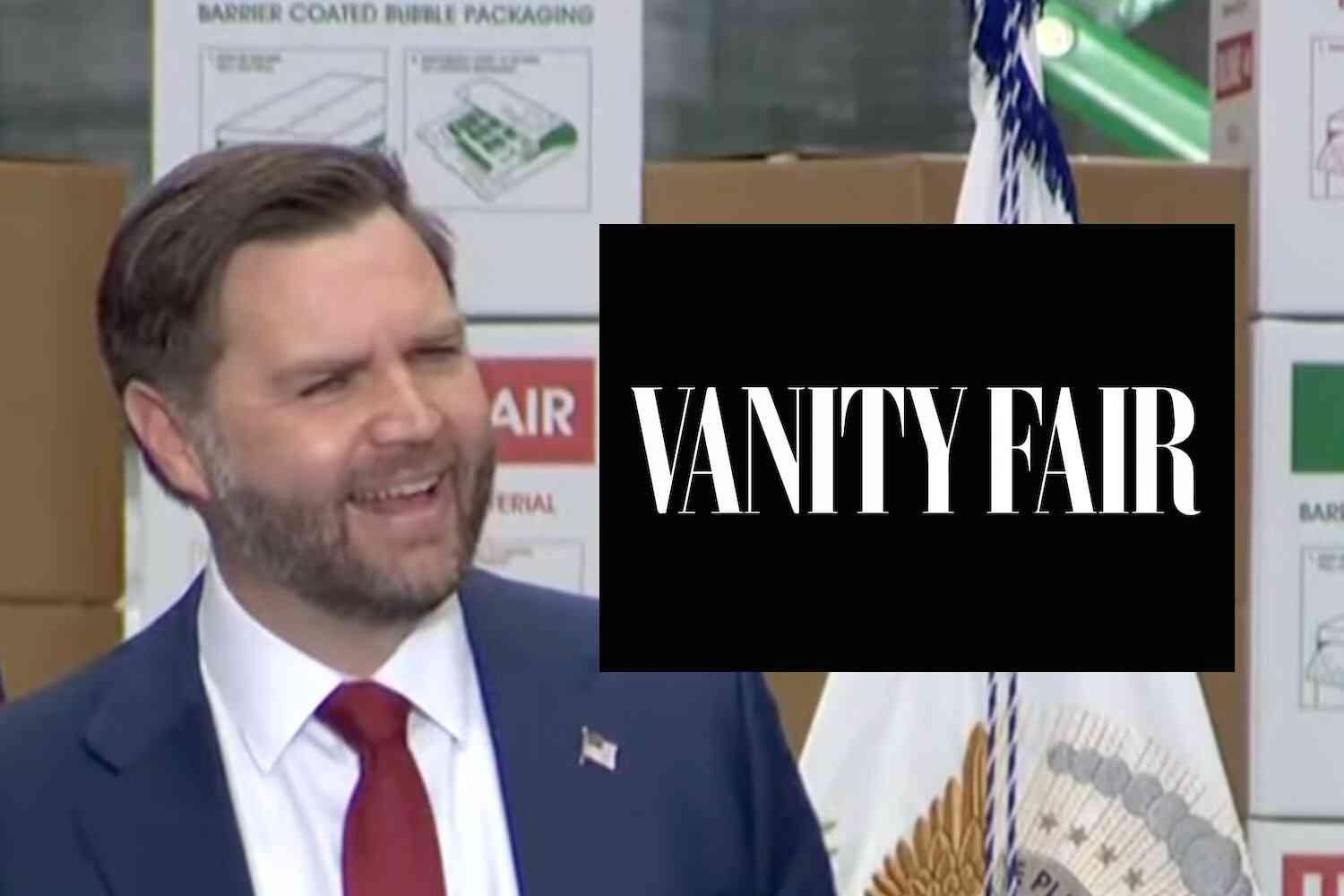My fellow men of Gondor, I was already voting for him. You don't need to sell him to me!
'I would have to say Tolkien,' Vance said [when asked his favorite author]. 'I'm a big Lord of the Rings guy, and I think, not realizing it at the time, but a lot of my conservative worldview was influenced by Tolkien growing up.' He added of Tolkien's colleague: 'Big fan of C.S. Lewis — really sort of like that era of English writers. I think they were really interesting. They were grappling, in part because of World War II, with just very big problems.'
He likes C.S. Lewis too??
WHAT A RADICAL!
...the venture capital firm [Vance] founded in 2019 is named Narya, named after one of those other rings that Gandalf wears. Vance's mentor Peter Thiel similarly named his company Palantir after the crystal ball used by Saruman in Lord of the Rings, and Vance has invested in the defense startup Anduril, named after Aragorn's sword.
ANDÚRIL, FLAME OF THE WEST!

Here's where Politico starts quoting random "experts":
Luke Burgis, author of a book about René Girard (another of Vance's intellectual heroes) and Catholic University of America professor, said he suspects 'Vance's appreciation of Tolkien is not unrelated to his conversion to Catholicism in 2019. Of the many ways that Tolkien's work exemplifies the Catholic imagination, one is the relationship between the visible and the invisible. I think it's fair to say that Vance believes there is real spiritual evil in this world, and it can become embodied in rites and rituals.' (At a closed-door speech in September 2021, Vance said, 'I believe the devil is real and that he works terrible things in our society.')
Oh, you mean he has baseline Christian beliefs?
Jesus himself cast out demons, was tempted by Satan in the wilderness, told his followers to pray that God would deliver them from the Evil One, and said "I saw Satan fall like lightning of heaven"? Jesus talked more about the devil and hell than anyone else in the Bible and it isn't even close!
And because Jesus' closest disciples said that the devil "prowls around like a roaring lion, seeking someone to devour" (1 Peter 5:8), that our fight is not against people but the "spiritual forces of evil in the heavenly realms" (Ephesians 6:12), and that the mission of Jesus was to "destroy the devil's works" (1 John 3:8)?
What a fringe belief believed by billions of people!
Vance likely took away from Tolkien 'an apocalyptic frame of mind' Burgis told me, a final and all-encompassing battle between good and evil. (A spokesperson for Vance did not respond to a request for comment for this story.)
The Left wants you to believe there is no real good and evil, and therefore there is no epic struggle to which we belong.
Then, in the next breath, they will tell you about the hegemonic oppression of white Christian colonizers and the need to #DoTheWork to be an #Ally to overthrow the Patriarchy and decenter "whiteness."
...his fandom also is in tension with some of Tolkien's ideas about how nation-states should approach the outside world. The books are, in many ways, anti-isolationist. Frodo wants to ignore the ill tidings and stay home but eventually realizes that the Shire isn't untouched by troubles elsewhere (like, say, NATO being pulled into defending Ukraine from Sauron Putin). In the end, Rohan, Gondor, the elves, ents and dwarves, all must band together and end their petty nationalist squabbles. Their lives are, they realize, interconnected.
Wow, that was cringe.
Sauron Putin?

Politico writer Ian Ward seems to understand Tolkien about as well as Amazon!
Frodo did want to stay home, but after Gandalf came and explained the history of the Ring to him, as well as current events, Frodo willingly went along. Sure, he delayed quite a bit, and that put him in hot water with the Ringwraiths in pursuit, but he was neither "isolationist" or concerned about the affairs of far-away kingdoms. He was a Hobbit from the Shire who liked to tend his own garden but willingly helped out when needed.
None of that has to do with a land dispute over historic Slavic territory in Eastern Europe involving two corrupt modern nation-states. Putin is not the Dark Lord Sauron, seeking to dominate the whole world and work its machinations to his own bidding.
Jessica Hooten Wilson, the Fletcher Jones Chair of Great Books at Pepperdine University, has taught Tolkien in her courses and spent time with Vance in 2019 at a conference focused on the Catholic writer Walker Percy. She told me Vance may have internalized the message that America, unlike Frodo, is not called to intervene abroad. 'I think this is where Tolkien did not want his work called allegory because he didn't want one way of reading his text,' she said. She added: 'I would also hope that whoever is reading the Lord of the Rings and Walker Percy is willing to learn from it rather than to make it say what they want it to say.'
Give it a break, Politico!
"May have internalized ... one way of reading ... make it say what they want it to say"
Why the heck are you talking to all these weird academics instead of simply asking Vance himself? How do you know how Vance is interpreting Tolkien or what his compendium of works means to Vance without asking Vance?
All of this is conjecture of the lowest order.
Rick Santorum, the former senator and two-time GOP presidential candidate, is a fellow Tolkien-pilled Catholic but he has different takeaways from Vance. He recounted to me this week how he has read Tolkien to his children. 'I always dreamed I would get interviewed about Lord of the Rings,' Santorum told me.
'I'm a huge Tolkien fan,' he continued. 'I'm also someone who believes that the message of Tolkien is that evil must be confronted. And so the idea is that well, we can wait until it comes to the Shire, but that is not a very good game plan. You gotta go to Mordor.'

Tolkien was clear that evil must be confronted, else it will spread and destroy everything.
But that's not the central message of Lord of the Rings.
C.S. Lewis reviewed his friend's work in August 1954 and titled his review "The Gods Return To Earth."
Lewis writes:
Almost the central theme of the book is the contrast between the Hobbits (or 'the Shire') and the appalling destiny to which some of them recalled, the terrifying discovery that the humdrum happiness of the Shire, which they had taken for granted as something normal, is in reality a sort of local and temporary accident, that its existence depends on being protected by the powers which Hobbits forget against powers which Hobbits dare not imagine, that any Hobbit may find himself forced out of the Shire and caught up into that high conflict. More strangely still, the event of that conflict between the strongest things may come to depend on him, who is almost the weakest.
Tolkien's own call to fight in WW1, and the events of WW2 when he was writing LOTR, certainly shaped his story.
But LOTR is not an allegory for the fight against Hitler, just as it is not an allegory today for the dictatorial oligarch of a country in Eastern Europe with the GDP of Florida.
Lewis:
What shows that we are reading myth, not allegory, is that there are no pointers to a specifically theological, or political, or psychological application. A myth points, for each reader, to the realm he lives in most. It is a master key; use it on what door you like. And there are other themes in The Fellowship equally serious.
The myth allows the story to be applicable in many ways to many people. But if there is allegory, it is the allegory of God choosing the weak things of the world to shame the strong (1 Corinthians 1:27-29) - a small hobbit finding the Dark Lord's master ring and a small hobbit destroying said Ring right under the nose of the Dark Lord echoes the cries of a baby in Bethlehem.
One more quote from Lewis:
Such a book has of course its predestined readers, even now more numerous and more critical than is always realized. To them a reviewer need say little, except that here are beauties which pierce like swords or burn like cold iron; here is a book that will break your heart. They will know that this is good news, good beyond hope.
Lord of the Rings haunts our hearts because it echoes the broken beauty of our own fallen world, along with the hope of redemption and resurrection to come.
There is no scenario where the Vice President of the United States reflects on that and comes out anything but a better leader and a better man.
Thanks for the campaign contribution, Politico!
P.S. Now check out our latest video 👇
Disclaimer: The opinions expressed in this article are those of the author and do not necessarily reflect the opinions of Not the Bee or any of its affiliates.









